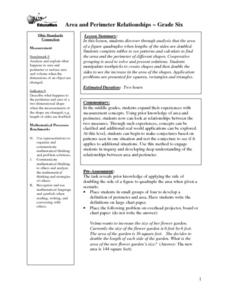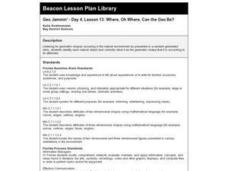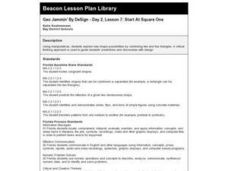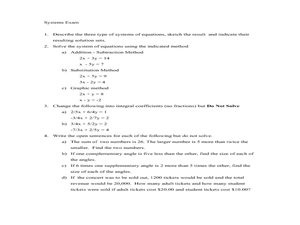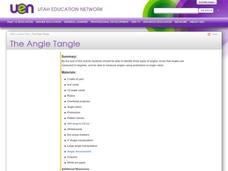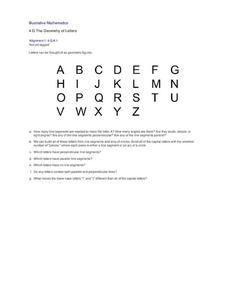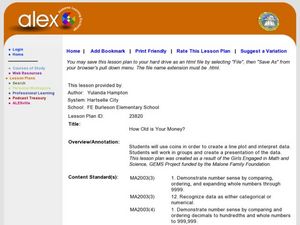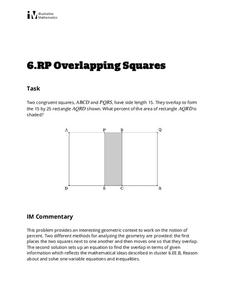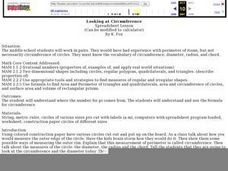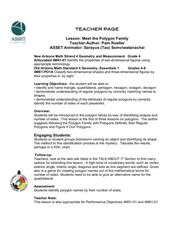Curated OER
Area and Perimeter Relationships
Sixth graders explore the relationship between area and perimeter. After discovering the definition of perimeter, 6th graders work together to create designs for a flower bed. They observe that the perimeter remains constant even...
Curated OER
More of Carrie's Cubes
Students solve a word problem that explores the shape of a cube and ways that part of it can be colored. They discuss the problem and analyze a Rubik's cube, explore the problem using a graph, and discuss the solutions as a class.
Curated OER
Geo Jammin' - Day 4, Lesson 15: Geo Jingo Jivin'
Second graders explore how musical instruments h ave varying geometric shape, and how those geometric shapes correspond to three-dimenaional shapes that students have studied.
Curated OER
Geo Jammin' - Day 4, Lesson 13: Where, Oh Where, Can the Geo Be?
Learners listen to a story "My Crazy Dream" with an intent to identify shapes in ordinary objects. They raise their hands when they've heard an object whose shape they can identify. They discuss their findings.
Curated OER
Tiling the Plane
Students use pattern blocks and triangular grid paper to review shape names, be introduced to the concept of a tiling of the plane, and determine which pattern blocks tile the plane. They are asked: "Have you ever seen a floor or a wall...
Curated OER
Geo Jammin' By DeSign - Day 2, Lesson 7: Start At Square One
Students examine new shape possibilities by combining two and four triangles using manipulatives.
Curated OER
Building With Triangles
Students participate in a unit on triangles. Through the unit they explore different way to make basic shapes using triangles. They also examine the basic properties of triangles and the relationships among basic geometrical shapes in...
Curated OER
Spatial Relationships
Students investigate the geometry concept of spatial relationships. They draw a replica of a cube. Students list the planes on the cube and go into further depth with identifying the parallel line in segments of the cube. The...
Curated OER
Volumes in 3-D
In this geometry activity, 11th graders calculate the volume of there dimensional shapes using the formula for cylinders. They are given the height and the base and asked to calculate the volume. There are 4 problems.
Curated OER
Angles
Fourth and fifth graders investigate angles and name them according to the criteria for obtuse, acute, and right angles. They examine a human-made yarn pattern on the floor of their classroom and identify angles, vertices, and types of...
Illustrative Mathematics
The Geometry of Letters
Use the alphabet as a tool for teaching your class about geometric figures. Break apart capital letters into line segments and arcs. Classify angles as right, acute, or obtuse. Identify parallel and perpendicular lines. An excellent...
Arizona State University
Tricorn Triangles
Help your learners examine triangles. Pupils explore the different sizes and measurements of triangles. They discover triangles can be isosceles or scalene, and examine the attributes of triangles. Here is the website where you can...
Alabama Learning Exchange
How Old is Your Money?
Elementary learners explore coin mint dates. First, they listen to the book Alexander Who Used to be Rich Last Sunday by Judith Viorst. They then sort a collection of coins according to their mint date and put them in order from oldest...
Illustrative Mathematics
Overlapping Squares
The objective of this activity is to find the percent of the area of a two squares overlapping. Mathematicians find the ratio of area for the part that overlaps to the rectangle formed. The final answer is a percent as a rate per 100....
Curated OER
Looking at Circumference
Young scholars understand where the number for pi comes from. They understand and use the formula for circumference. Students measure the circles given out and the diameters of those circles and record the results on their worksheet.
Teach Engineering
Circuits and Magnetic Fields
Have your class use compasses to try to find the magnetic field around an electric current. Groups use the same technique to visualize magnetic fields as they did in the second activity in the series, but this time, the field is...
Curated OER
Around the Clock
Young scholars discover the relationship between the circumference of a circle and its diameter. They find the length of an arc of a circle.Students use estimation strategies in real-world applications to predict results (i.e.,...
Mathematics Assessment Project
Designing 3d Products: Candy Cartons
Wouldn't it be great to work in a candy factory? Learners get their chance as they first design a carton for a candy that meets certain requirements. They then examine and analyze nets and explanations in sample student responses.
Curated OER
Meet the Polygon Family
Fourth graders investigate regular polygons. In this regular polygon activity, 4th graders explore the attributes of different polygons. Students work in groups to complete a KWL chart regarding polygons.
Curated OER
Tetrominoes Cover-Up
Third graders are given square tiles and participate in a demonstration on how to arrange them. Using the tiles, they work with a partner to discover how many two-dimensional tetrominoes they can create. To end the lesson, they must...
Curated OER
Parks Design Project
Pupils explore two dimensional geometric figures. They explore the relationships and measurements of geometric figures. Students apply proportion and scaling. They design a city park for pupils and teenagers.
Curated OER
Cones, Cylinders, Spheres
Students classify polygons by name and shape. In this geometry lesson, students identify the lateral surface of each conic. They differentiate between cones, cylinders and spheres.
Curated OER
Fold and Cut
Second graders explore line symmetry and the names and attributes of two-dimensional mathematical shapes. They study the context by folding and cutting out shapes to make a series of mathematical shapes.
Curated OER
More Prisms/Nets
Students calculate the volume and surface are of three-dimensional shapes. In this geometry lesson, students use the nets to prove their calculations of shapes. They identify the different parts of a solid using the nets.
